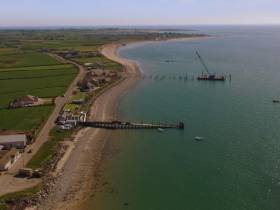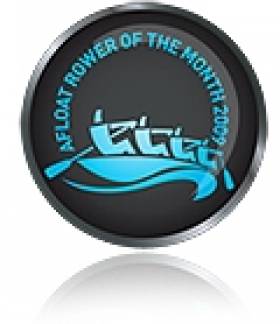Displaying items by tag: June
New Carlingford Lough Car Ferry Ready to Set Sail
#NewService - A new car ferry service is ready to be rolled out on Carlingford Lough in June this year, according to operating company Scenic Carlingford Ferry.
The ferry company writes The Dundalk Democrat made the announcement via their website: "The new cross border vehicular ferry service will link Greenore and Greencastle in Co Down across the iconic Carlingford Lough and will commence operations in June. The works are already attracting large numbers of visitors to view the progress.
"This project, which has taken almost 10 years to bring to fruition, will be one of the most strategic infrastructure investments in the region. The €9.75 million (£8.5 million) project is entirely privately financed and is being developed by Frazer Ferries Group.
"This will be the first vehicular ferry across Carlingford Lough. The previous two ferries having carried passengers only. The first ferry was recorded in 1185 AD and sailed between the medieval castles at Carlingford and Greencastle, then was followed by the Greenore Greencastle ferry which carried the first “tourists”, during the 19th century.
To read more on the development, click here.
Single and Double Success Brings O'Donovan Afloat Honour
#Rowing: Paul O’Donovan is set to have an extraordinary August, competing at the Olympic Games in Rio de Janeiro and the World Rowing Championships in Rotterdam. He is named the Afloat Rower of the Month for his achievements in June. Paul and his brother, Gary, continued their impressive run in the lightweight double sculls. They took fourth in the World Cup regatta in Poznan, Poland. They placed ahead of Britain, who were silver medallists at the World Championships in 2015, in both the repechage and the final. Germany, who were sixth last year, could not qualify from the repechage, which was won by Ireland in the fastest time they have done in a race. They head off to a block of training in Spain having moved from 11th in the world last year to a ranking of 5th in the bookies’ odds for Rio.
Paul O’Donovan has been chosen to compete in the lightweight single in Rotterdam. In a shoot-out with Gary at Cork Regatta in the senior single he proved his credentials with a big win. Despite being a lightweight, he is the best single sculler in Ireland.
Rower of the Month awards: The judging panel is made up of Liam Gorman, rowing correspondent of The Irish Times, and David O'Brien, editor of Afloat magazine. Monthly awards for achievements during the year will appear on afloat.ie and the overall national award will be presented to the person or crew who, in the judges' opinion, achieved the most notable results in, or made the most significant contribution to rowing during 2016. Keep a monthly eye on progress and watch our 2016 champions list grow.
Trinity Senior Eight are Afloat Rowers of the Month
#ROWING: The Afloat Rowers of the Month for June are Trinity’s men’s senior eight. The Dublin University Boat Club crew had a convincing win in the Division One final at Cork Regatta, outpacing UCD and NUIG/Gráinne Mhaol. They crew took the Leander trophy, one of the most impressive prizes on offer in Irish sport. Well done to: Gearóid Mahon, Ian Hurley, John Magan, Michael Corcoran, Patrick Moreau, Mark Kelly, Liam Hawkes, David Butler and cox Cian Flynn.
Rower of the Month awards: The judging panel is made up of Liam Gorman, rowing correspondent of The Irish Times and David O'Brien, Editor of Afloat magazine. Monthly awards for achievements during the year will appear on afloat.ie and the overall national award will be presented to the person or crew who, in the judges' opinion, achieved the most notable results in, or made the most significant contribution to rowing during 2015. Keep a monthly eye on progress and watch our 2015 champions list grow.































































